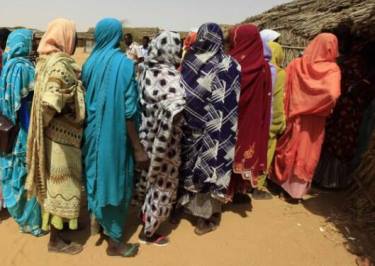Sudan: pregnant gang rape victim charged with adultery, prostitution
February 19, 2014 (KHARTOUM) – An 18-year-old Ethiopian woman, who was gang raped by seven men in Sudan, is facing a possible death sentence after being charged with adultery and prostitution.

It’s understood the request was turned down on the basis that that the woman is facing other charges and that she did not come forward immediately after the incident.
It’s alleged the attack took place in August 2013 when the woman was lured to an empty property while searching for a rental home in Omdurman, which neighbours the capital, Khartoum, where she was pinned down and raped by seven men.
The incident was filmed by one of the victim’s attackers, with the footage later surfacing on social media sites in January.
The woman, along with her attackers, was subsequently detained under Articles 153 and 154 of Sudan’s criminal code, pertaining to the making and distribution of indecent material and indecent behaviour.
FRESH CHARGES
After the court case began on the 6 February, the charges against the woman and the seven alleged perpetrators were upgraded to include Articles 151 referring to scandalous acts, 154 relating to prostitution, and 146 which refers to adultery.
A police officer who spoke to the victim shortly after her ordeal, but decided against pursuing an investigation as it was the Eid Al Fitr holiday has been charged with negligence, while a security officer who distributed the video online will also face trial.
SIHA said the woman, who is married and was about three months pregnant at the time of the attack, initially decided not to report the rape out of fear after her attackers threatened further violence.
“The intention to place culpability on the part of the victim is of great concern and seeks to deflect and reduce accountability of the perpetrators, but more disturbing is that the charge of adultery carries with it the potential sentence of death by stoning if found guilty,” the women’s advocacy group said in a public statement on its website.
“Denying her the ability to make a formal complaint which serves to refute the charges being laid against her and pursue justice, renders the perpetrators immune from accountability and violates the rights of the victim,” it adds.
LEGISLATION WEAK
SIHA says existing legislation severely limits the pursuit of justice for rape survivors in Sudan, with the burden of proof resting primarily on the victim.
The ambiguity of Article 149 itself, which defines rape as committing non-consented Zina (adultery), also leaves the legislation open to arbitrary interpretation.
“The vague legislation with a strong burden of proof on the victim has meant that few cases are ever successfully prosecuted and often victims are prosecuted and persecuted,” SIHA said.
The woman, who is now nine months pregnant, is being held in a bare cell and until recently did not even have a mattress. Bail requests on her behalf have so far been rejected by the attorney-general.
Migrants in Sudan have reported experiencing substantial mistreatment and marginalisation by Sudanese authorities and the local community at large. Significant animosity is directed towards Ethiopians in Sudan on the pretext that they are stealing jobs. Migrant women, who often work in low-skilled jobs in public places, are particularly vulnerable to harassment, due to negative social perceptions that they are HIV carriers or prostitutes.
The victim herself has faced such allegations since the case became public, with SIHA accusing Sudanese media of conducting in cynical campaign to defame the victim and discredit her character.
Although rarely executed, the sentence of stoning for adultery has been deployed twice in recent years, both times in 2012. However, the sentences were subsequently overturned following successful appeals in both cases.
(ST)
